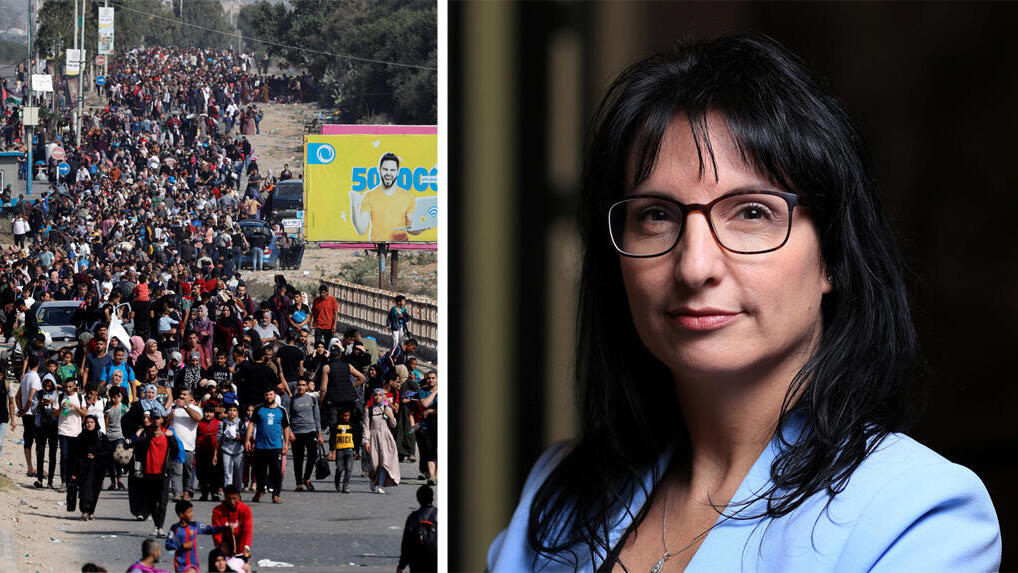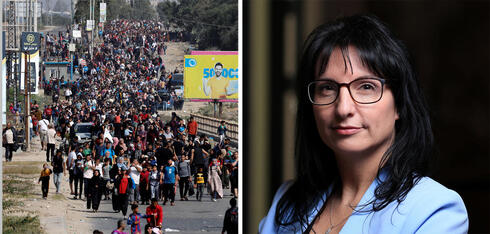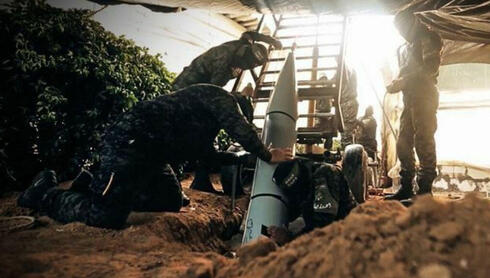
ISRAEL AT WAR
“Hamas’ attack cost them billions, their financial bunker needs to be destroyed”
Dr. Shlomit Wagman, a global expert in the financial fight against terrorism, dealt with ISIS and knows how to eradicate Hamas and Hezbollah - by destroying their financial infrastructure.
Dr. Shlomit Wagman, an expert on terror financing, testified before the American Senate last week following Hamas’ surprise attack on October 7 when thousands of Hamas terrorists broke through Israel’s border with Gaza, massacring hundreds of Israeli civilians inside Israeli territory. At least 1,400 Israelis were murdered, mainly civilians including children, women, and the elderly, with tactics reminiscent of ISIS. Thousands more were injured and about 240 people including women, children, babies, the elderly, and soldiers were abducted by Hamas into Gaza. In response, the IDF has been targeting Hamas infrastructure in Gaza for three weeks in an attempt to dismantle its rule.
Hamas may already be a thing of the past, but what else can be done to prevent Hezbollah from gaining economic strength?
"Unfortunately, Hamas is not finished - it is still an organization with a very significant infrastructure. Physical dismantlement is essential, but it isn’t enough: Hamas also needs to be undermined economically. Just blowing up the physical bunker is not sufficient - we need to destroy its financial bunker too because otherwise it will persist. Hamas' money is not held in cash, so, just like with Iran and previously with ISIS there is a lot of work involved in locating, freezing, and tracking accounts in various banks.
“This is not something that Israel can do alone, it requires international effort. In the war against ISIS, I was part of a team that located and tracked accounts as part of the Financial Action Task Force (FATF)'s efforts – an international task force to track criminal and terrorist funds. Every four months we produced reports for intelligence agencies worldwide. We created global pressure that exposed the entire financial infrastructure of ISIS, from Iraqi banks used to trade antiquities and cryptocurrency, with Israel being the first to point out ISIS’ use of cryptocurrency."
There is a feeling that economic strangulation is always done retrospectively and not in real time. What, for example, is being done today regarding Hezbollah?
"We could have been more active concerning Hamas if there had been an international understanding, including in Israel, that it is an organization that needs to be fought to the end. But that was not the perception. Even though Hamas was declared a terrorist organization by the United States, owing largely to Israel's efforts, dealing with it financially was not a top priority for anyone. The concept was to feed Hamas financially, and that's how we reached October 7.
“Hezbollah has much more money than Hamas and its funding sources are even more complex. Therefore, to deal with it financially, a global coalition is needed. We don't really know how involved Hezbollah is in the Lebanese economy, what the legitimate parts are, and what are less legitimate. This is also true for the Palestinian Authority, a governmental body that has never been reviewed or scrutinized to the extent required today for states."
Related articles:
In the Senate, you spoke about how to financially dismantle a terrorist organization. What are the main challenges?
"One of the significant challenges in tracking and halting terrorist financing is that it usually doesn’t involve large sums of money. For example, the entire cost of 9/11 was only half a million dollars. The attack on the Bataclan Theater in Paris cost only a few hundred thousand euros, mainly for weapons and prepaid cards for cell phones. This creates a challenge for international task forces like FATF, established to combat financial crimes, as they are typically focused on much larger sums of money. Another different characteristic of terrorism compared to financial crimes is that criminals often launder black money, but terrorists do the opposite. They use legitimate funds, sometimes coming from donations or humanitarian purposes, which they turn black. Therefore, the tools used to deal with ordinary crimes don’t apply."
How much did Hamas’ attack cost them?
"The attack by Hamas on October 7 was indeed a costly event, estimated to be billions of dollars. This includes extensive training, the massive quantity of weapons, and the tunnels that were built in advance."
What are the sources of funding for Hamas, aside from the Qatari suitcases and Netanyahu?
"Their primary funding is state-sponsored. Iran, despite its difficult economic situation, transfers between $30-100 million to Hamas each year. Qatar adds an additional $200-450 million. In addition, Hamas collects taxes from Gazans. Another significant channel is Hamas’ large investment portfolio, worth billions of dollars, and generating dividends and annual returns of tens of millions of dollars. These are often registered through numerous companies which make it difficult to identify the original owner of the money."
Is it possible that investment management companies are unknowingly managing investment portfolios for Hamas?
"It is possible, and that's why we are very meticulous in our examination to reach the last company in complicated structures. However, most assets are managed by financial entities in Gulf states."
How does the fintech boom affect the funding methods of terrorist organizations?
"Many fundraising campaigns collect funds through companies like PayPal, Rapyd, Stripe, or Payoneer to take advantage of them for donations to Hamas. This creates another channel generating tens of millions of dollars for Hamas each year. On October 7 I instructed Rapyd to search for keywords like 'Gaza Now' and others to identify and prevent it from becoming a funding channel for Hamas. Since October 7 the entire fintech community mobilized, and within minutes, groups were created from within the industry along with IDF elite intelligence personnel. It was clear that after such an attack, there would be a surge in campaigns associated with Hamas, and all of the groups, including Rapyd, are still working today to block accounts and update enforcement measures. This is the first time in history that the public is efficiently and rapidly creating intelligence reports for enforcement agencies."
How can a fintech company or a banking entity outside of Israel identify a campaign that transfers money to Hamas?
"Sometimes people donate without even knowing that they are contributing to Hamas because it is branded as a clean donation (associated with a seemingly innocuous organization and cause). The work being done in Israel and globally to update all financial systems regarding the money trail must be sanctioned. The strongest sanction would be from the UN Security Council, but the problem is that, due to Russia's influence in the Security Council, it is difficult to achieve. The next best thing would be for sanctions at the state level, preferably by the United States and the European Union. All transactions in dollars and euros would be frozen, and most transactions eventually pass through these currencies. The U.S. has woken up and issued many sanctions in the last month relating to Hamas, not only at the organizational level but also individuals and even on Chiehings — but it's too little and too late."
Is foreign exchange also a tool for transferring funds to Hamas?
"Money flows through various channels, including cash, goods, foreign exchange, and of course, through crypto. Even the Israeli government, in recent years, as part of ‘the concept,’ allowed money transfers, despite opposition from the anti-money laundering authority. But that is not the main source of funds. The real money comes from Iran via Lebanon or Turkey, even through classic cash smuggling using tunnels. More creatively, Iranian money is used to purchase items like toys or chocolate in Turkey, which are then sold in Gaza, with all the proceeds going to Hamas. This is the most challenging to trace."
So crypto is becoming, as feared, a paradise for black money.
"Hamas has been using crypto since 2019, and Israel identified several digital wallets associated with Hamas back in 2020. Technology can be either beneficial or destructive, but it will persist with or without us; the key is to manage the risk. Even the FATF understood a few years ago that crypto poses significant risks in the field, arguing that any entity operating wallets and platforms is responsible for verifying their clients. Crypto is currently an unregulated area, but if left unmanaged, it will become enormous."
Last week, Dr. Wagman gave a lecture called "Financing Terror" at Harvard University. The announcements about the lecture caused an uproar, security was increased, and this after the name was carefully and it was decided not to explicitly mention Hamas.
What is it like to be an Israeli lecturer on a campus that has proven to be such fertile ground for antisemitism?
"The campus is highly political, and there was considerable pressure leading up to my lecture, but this is the way, I believe, to influence the discourse in a real way. If I hadn't been there, the students would have been exposed to only one side, only to the humanitarian aspect of the situation. Israel needs to learn to infiltrate the discourse down to the TikTok level and explain what 'from the river to the sea' really means. For most of those shouting this slogan, it's just a slogan combined with an automatic identification with the weak."
How effective is the approach of ending donations to Harvard, as the Ofer family did, and other universities following their tepid responses to Hamas’ massacres?
"Ending donations is a dramatic mistake. Donations should be used as a means to influence. Harvard is a very wealthy university with an endowment of $50 billion, and with all due respect to the significant donations from Jewish families, financially, it doesn't really affect the university. The approach needs to be different because anywhere an Israeli or Jew is present, it balances the discourse, and our situation is much better. Therefore, it's a mistake to disappear from the room where decisions are made. Those with financial influence at education institutions where future leaders are educated should reconsider their ongoing support, conditioning it on a change in content to reflect a pro-Israeli narrative."
How significant and impactful is the announcement that hedge funds and major law firms won't hire students participating in the anti-Israel demonstrations?
"It is precisely the right kind of pressure, and it's good that it comes not from Israel but from the U.S. The statement from law firms is not a list of Jewish law offices but all of the major ones. It greatly disturbs the students. It is important to remember that today's students are the first generation born after September 11 and don’t fully comprehend what terrorism really is."
Dr. Shlomit Wagman is a Research Fellow at the M-RCBG at Harvard Kennedy School, and the Chief Global Regulation Officer at Rapyd, a global Fintech unicorn. She is the former Chair of Israel’s Money Laundering and Terrorism Financing Prohibition Authority and the former Chair of the Risks, Typologies and Methodologies Group at the Financial Action Task Force, the inter-governmental organization that sets global policy on money laundering and terrorism financing.

